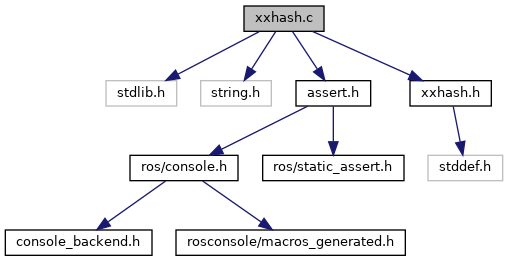|
| XXH_PUBLIC_API unsigned int | XXH32 (const void *input, size_t len, unsigned int seed) |
| |
| static U32 | XXH32_avalanche (U32 h32) |
| |
| XXH_PUBLIC_API void | XXH32_canonicalFromHash (XXH32_canonical_t *dst, XXH32_hash_t hash) |
| |
| XXH_PUBLIC_API void | XXH32_copyState (XXH32_state_t *dstState, const XXH32_state_t *srcState) |
| |
| XXH_PUBLIC_API XXH32_state_t * | XXH32_createState (void) |
| |
| XXH_PUBLIC_API unsigned int | XXH32_digest (const XXH32_state_t *state_in) |
| |
| FORCE_INLINE U32 | XXH32_digest_endian (const XXH32_state_t *state, XXH_endianess endian) |
| |
| FORCE_INLINE U32 | XXH32_endian_align (const void *input, size_t len, U32 seed, XXH_endianess endian, XXH_alignment align) |
| |
| static U32 | XXH32_finalize (U32 h32, const void *ptr, size_t len, XXH_endianess endian, XXH_alignment align) |
| |
| XXH_PUBLIC_API XXH_errorcode | XXH32_freeState (XXH32_state_t *statePtr) |
| |
| XXH_PUBLIC_API XXH32_hash_t | XXH32_hashFromCanonical (const XXH32_canonical_t *src) |
| |
| XXH_PUBLIC_API XXH_errorcode | XXH32_reset (XXH32_state_t *statePtr, unsigned int seed) |
| |
| static U32 | XXH32_round (U32 seed, U32 input) |
| |
| XXH_PUBLIC_API XXH_errorcode | XXH32_update (XXH32_state_t *state_in, const void *input, size_t len) |
| |
| FORCE_INLINE XXH_errorcode | XXH32_update_endian (XXH32_state_t *state, const void *input, size_t len, XXH_endianess endian) |
| |
| XXH_PUBLIC_API unsigned long long | XXH64 (const void *input, size_t len, unsigned long long seed) |
| |
| static U64 | XXH64_avalanche (U64 h64) |
| |
| XXH_PUBLIC_API void | XXH64_canonicalFromHash (XXH64_canonical_t *dst, XXH64_hash_t hash) |
| |
| XXH_PUBLIC_API void | XXH64_copyState (XXH64_state_t *dstState, const XXH64_state_t *srcState) |
| |
| XXH_PUBLIC_API XXH64_state_t * | XXH64_createState (void) |
| |
| XXH_PUBLIC_API unsigned long long | XXH64_digest (const XXH64_state_t *state_in) |
| |
| FORCE_INLINE U64 | XXH64_digest_endian (const XXH64_state_t *state, XXH_endianess endian) |
| |
| FORCE_INLINE U64 | XXH64_endian_align (const void *input, size_t len, U64 seed, XXH_endianess endian, XXH_alignment align) |
| |
| static U64 | XXH64_finalize (U64 h64, const void *ptr, size_t len, XXH_endianess endian, XXH_alignment align) |
| |
| XXH_PUBLIC_API XXH_errorcode | XXH64_freeState (XXH64_state_t *statePtr) |
| |
| XXH_PUBLIC_API XXH64_hash_t | XXH64_hashFromCanonical (const XXH64_canonical_t *src) |
| |
| static U64 | XXH64_mergeRound (U64 acc, U64 val) |
| |
| XXH_PUBLIC_API XXH_errorcode | XXH64_reset (XXH64_state_t *statePtr, unsigned long long seed) |
| |
| static U64 | XXH64_round (U64 acc, U64 input) |
| |
| XXH_PUBLIC_API XXH_errorcode | XXH64_update (XXH64_state_t *state_in, const void *input, size_t len) |
| |
| FORCE_INLINE XXH_errorcode | XXH64_update_endian (XXH64_state_t *state, const void *input, size_t len, XXH_endianess endian) |
| |
| static void | XXH_free (void *p) |
| |
| static int | XXH_isLittleEndian (void) |
| |
| static void * | XXH_malloc (size_t s) |
| |
| static void * | XXH_memcpy (void *dest, const void *src, size_t size) |
| |
| static U32 | XXH_read32 (const void *memPtr) |
| |
| static U64 | XXH_read64 (const void *memPtr) |
| |
| static U32 | XXH_readBE32 (const void *ptr) |
| |
| static U64 | XXH_readBE64 (const void *ptr) |
| |
| FORCE_INLINE U32 | XXH_readLE32 (const void *ptr, XXH_endianess endian) |
| |
| FORCE_INLINE U32 | XXH_readLE32_align (const void *ptr, XXH_endianess endian, XXH_alignment align) |
| |
| FORCE_INLINE U64 | XXH_readLE64 (const void *ptr, XXH_endianess endian) |
| |
| FORCE_INLINE U64 | XXH_readLE64_align (const void *ptr, XXH_endianess endian, XXH_alignment align) |
| |
| static U32 | XXH_swap32 (U32 x) |
| |
| static U64 | XXH_swap64 (U64 x) |
| |
| XXH_PUBLIC_API unsigned | XXH_versionNumber (void) |
| |
| #define XXH_ACCEPT_NULL_INPUT_POINTER 0 |
XXH_FORCE_MEMORY_ACCESS : By default, access to unaligned memory is controlled by memcpy(), which is safe and portable. Unfortunately, on some target/compiler combinations, the generated assembly is sub-optimal. The below switch allow to select different access method for improved performance. Method 0 (default) : use memcpy(). Safe and portable. Method 1 : __packed statement. It depends on compiler extension (ie, not portable). This method is safe if your compiler supports it, and generally as fast or faster than memcpy. Method 2 : direct access. This method doesn't depend on compiler but violate C standard. It can generate buggy code on targets which do not support unaligned memory accesses. But in some circumstances, it's the only known way to get the most performance (ie GCC + ARMv6) See http://stackoverflow.com/a/32095106/646947 for details. Prefer these methods in priority order (0 > 1 > 2)
XXH_ACCEPT_NULL_INPUT_POINTER : If input pointer is NULL, xxHash default behavior is to dereference it, triggering a segfault. When this macro is enabled, xxHash actively checks input for null pointer. It it is, result for null input pointers is the same as a null-length input.
Definition at line 71 of file xxhash.c.
| #define XXH_FORCE_NATIVE_FORMAT 0 |
XXH_FORCE_NATIVE_FORMAT : By default, xxHash library provides endian-independent Hash values, based on little-endian convention. Results are therefore identical for little-endian and big-endian CPU. This comes at a performance cost for big-endian CPU, since some swapping is required to emulate little-endian format. Should endian-independence be of no importance for your application, you may set the #define below to 1, to improve speed for Big-endian CPU. This option has no impact on Little_Endian CPU.
Definition at line 83 of file xxhash.c.
